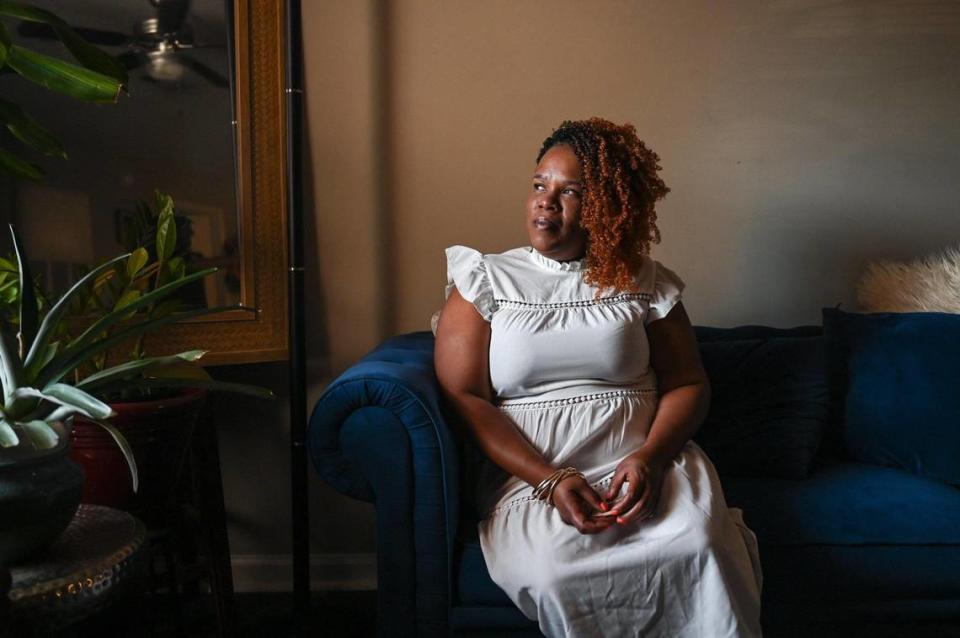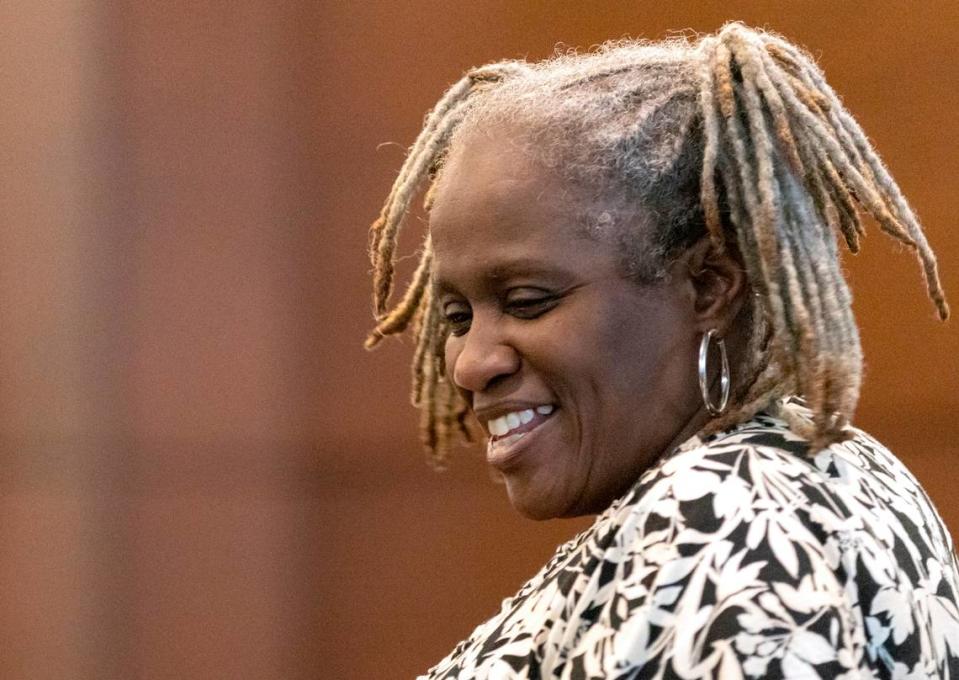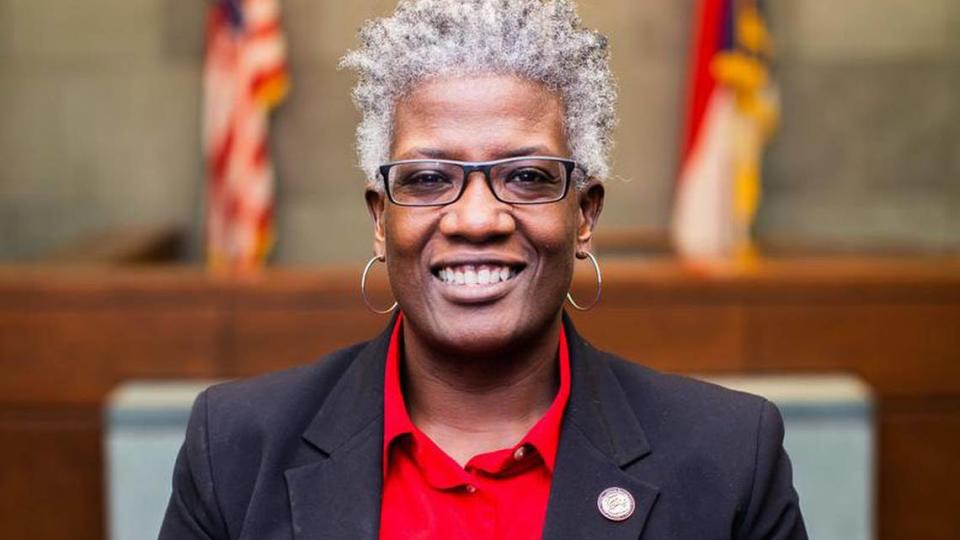Lawsuits: Durham lawyer ghosted prisoners who paid thousands seeking reduced sentences
- Oops!Something went wrong.Please try again later.
Rashida King emptied her bank account and sought money from relatives to raise $15,000 to try to help her brother, Timothy, get his life sentence reduced.
Mark Brock’s family put up $15,000, finally believing they found the right person to get him home.
Andrew Canty used $10,000 of inheritance he received after his mother died in 2019.
All were convicted of first-degree murder in North Carolina and have spent from nine to 26 years in prison. And all sought help from the same person to reduce their life sentences: Lisa Williams, a Durham County criminal defense attorney.
The circumstances seemed so right, said the incarcerated men and family members. Again and again, they were hearing and seeing that Williams’ clients were leaving prison.
“I know she knows what she is doing,” Tracey Cameron recalls cousin Timothy King telling her in the summer of 2021. “She got a lot of people home.”
But years after paying Williams from $10,000 to $15,000, the men allege in lawsuits and a complaint to the attorney general that they have no evidence that Williams advanced their cases before cutting off contact.
King, Brock and Abdulkadir Ali, another dissatisfied client in state prison, have filed lawsuits against Williams. The men filed their lawsuits on their own without attorneys. A hearing on Williams’ motions to get the cases dismissed is scheduled in Durham this week.

Each said they contacted the North Carolina State Bar and explored getting help through its fee dispute program or by filing a grievance. Canty also sent a letter to the N.C. Attorney General asking for help getting his money back.
“When I began to question why she hadn’t retrieved my case file, transcripts, or discovery, she stopped answering my calls and messages, as well as those of my people for over eight months,” he wrote in his June complaint.
Canty and one other client who have not sued told The News & Observer they had similar frustrations with Williams. Prosecutors in counties where the men were convicted said they have no record of Williams filing anything or reaching out to their office on the five men’s behalf.
Williams vigorously denies that she shortchanged any clients. Williams agreed to investigate when they hired her, not take immediate action in a courthouse, she said in written responses and court documents.
She hasn’t finished her investigations in two cases, she wrote in written responses to questions after declining requests to be interviewed. In another case, she determined there was nothing to do for the client, she said. She cut off contact with one family because they were “rude and aggressive,” she said.
Williams also denies unreasonably getting the men and their families’ hopes up before they retained her.
“People retain me because they are hopeful I can help them,” Williams wrote. “But I always tell them I have to investigate first, and I never guarantee results.”
Have concerns about your North Carolina attorney? Here are steps to seek help.
Hope amid call for change
Brock and others’ hopes for shortened prison sentences were elevated in 2020, amid an increased call nationally and in North Carolina for criminal justice reform and reassessing the fairness of long sentences doled out years ago.
Around that time, they started to hear about Williams’ success at getting clients’ sentences reduced. In interviews, most said Williams never guaranteed she could shorten their sentences, but she gave them hope.
To Rashida King, Williams was very confident, she said.
“She repeatedly, with total confidence, assured me that there were so many legal (wrongs) against my brother and old laws that it would be no problem to get him released from prison,” Rashida King said in an affidavit filed in her brother’s court case.
Canty first learned of Williams in a news article years ago, he said. More recently, he said, he talked to another man in prison who Williams helped get released before his full sentence was served.
“I didn’t know the specifics. That doesn’t really matter to me,” Canty said. “For me it was just finding somebody who was going to get me the best shot for going home.”
What Williams’ critics say is they didn’t realize that her successes were confined to Durham County, where Williams lives and has worked as a prosecutor and defense attorney for decades.
There, between 2019 and 2022, the district attorney and a since-retired judge embraced and streamlined the process to vacate and reduce sentences through a legal mechanism called motions for appropriate relief.
Those critical of Williams had hired her to seek help with convictions in counties where sentence reductions for violent crimes are rare.
All the lawsuits filed against Williams allege breach of contract. Brock’s filing also alleges attorney malpractice and fraud. King’s suit says he would settle for $14,700; Ali asked for $8,000 and Brock seeks $25,000.
Williams has sought to have the cases dismissed, arguing that the men filed in the wrong venue since the threshold for Superior Court civil suits is $25,000. Attorney Lynn Fontana, who represents Williams, also contends the men’s lawsuits don’t make proper legal arguments for their claims.
Who is Lisa Williams?
Williams graduated from UNC-Chapel Hill’s law school in 1994 and worked as an assistant district attorney in Durham for four years, before going into an active private practice in 1998, with extensive trial work.
Williams has represented at least 95 people charged with first-degree murder, she told The N&O, with only two sentenced to life and with everyone else receiving a release date or a dismissal. She began to do post-conviction work in 2019, she said.
Williams’ success in shortening sentences for men convicted of violent crime began in Durham after District Attorney Satana Deberry streamlined the process in 2019. One of several politically progressive district attorneys elected across the United States in 2018, Deberry leaned into reducing unfair sentences through motions for appropriate relief.

Motions for appropriate relief are tools lawyers use to attempt to correct errors that can occur before, during, or after a trial or when entering guilty pleas in criminal cases. The motions typically are made to address errors that occurred prior to sentencing, such as prosecutors failing to disclose key evidence, a defendant having ineffective counsel or paperwork flaw resulting in a longer sentence than prescribed by law, according to interviews.
The typical process to pursue motions for appropriate relief in North Carolina includes judges reviewing an often inch-thick or more court filing outlining mistakes or injustices, according to interviews with prosecutors across the state. Then judges decide whether to set the case for a hearing, the prosecutors said.
During that hearing, the district attorney often defends a conviction, as the defense attorney argues that mistakes occurred in the process, district attorneys confirmed.
Under Deberry, prosecutors in some cases evaluated cases and negotiated with defense attorneys before presenting paperwork to former Senior Resident Superior Court Judge Orlando Hudson for his signature, events that occurred in open court but without a formal hearing. A News & Observer reporter witnesses this process on multiple occasions.
State law allows that, according to legal experts, but not all district attorneys agree with the approach.
Deberry has said that she doesn’t track how many of these motions have been successful in Durham County. But state prison and court data identifies at least 60 individuals convicted of serious felonies whose sentences were reduced between 2019 and 2022 in Durham County.
Five involved property crimes and 15 involved drug offenses, such as trafficking, the records show. Forty involved violent or sexual offense crimes, including murder and rape.
The number appears to be much higher than successes in other prosecutorial districts considering the reductions of such sentences are rare, according to interviews with prosecutors outside Durham.
Redressing an unfair history?
Deberry said in an email that there is evidence of problems with the prosecution of defendants in Durham over the years, including two Durham district attorneys who were removed from office for prosecutorial misconduct. Mike Nifong resigned and was later disbarred in 2007 for his handling of unfounded rape allegations against Duke University lacrosse players. Tracey Cline was ousted from office in 2012 related to statements she made about Judge Hudson.

“This office is keenly aware of that history and makes every effort to be as open and as fair as possible,” Deberry wrote in an email.
Williams from 2019 to 2022 represented at least 11 people whose sentences were vacated or reduced through motions for appropriate relief in Durham County, according to court and prison data. Ten of those cases involved clients convicted of violent felonies, including first-degree murder. Another involved a drug trafficking charge.
Williams said that she hasn’t had any successful motions for appropriate relief involving violent convictions outside of Durham County.
Williams said that she tells clients that there is no guarantee and the chances she can get sentences reduced are slim. Her initial fee of $15,000 is for an investigation into whether a motion for appropriate relief should be filed, Williams said she tells clients. If she discovers an issue there will likely be additional fees, she said.
The fee is similar to what other attorneys charge to investigate post-conviction cases, she wrote, as it requires her to read lengthy court documents to evaluate what the prosecutor, defense and appellate lawyers did in the case.
“If I charged by the hour it would be more than $15,000,” she wrote.
The only reference Williams made to not being responsive to clients was a tragic event in September 2018, when her 20-year-old daughter died unexpectedly from a pulmonary embolism.
“I am sure there were times I was unable to communicate quickly with clients, and I am very sorry for that,” Williams wrote.
The men and their families hired Williams between August 2020 and June 2021.
‘He was adamant’
Timothy King’s sister, Rashida, moved in April 2021 to North Carolina from New York to be closer to her older brother, who is incarcerated in Johnston Correctional Institute.
The siblings grew up in Brooklyn, but he strayed from the family. In October 1997, King was convicted of the first-degree murder of Todd Mapp and possession of a firearm by a felon in Lenoir County after a dispute at a nightclub, according to court documents.
King, now 49, was sentenced to life. “I never loved him any less,” Rashida King said.

By June 2021, her brother started talking to her about hiring Williams, who he had heard about from other Muslim inmates, including Gregory Lee and Khuram Choudhry, two men who had success in reducing their life sentences in Durham after Williams represented them on motions for appropriate relief on their behalf.
“He was adamant,” Rashida King said.
Both Rashida King and her cousin, Tracey Cameron, communicated with Williams, they said, and her statements gave them hope that Timothy King might actually come home.
The family believed that Williams would file a motion for appropriate relief and attend King’s pending parole hearing in July 2022, they said.
Cameron said Williams told her there was an 80% chance she could get Timothy King out because he didn’t have a fair trial.
Williams denies this, writing that she is upfront with her clients about the uphill battle to undo a conviction.
“I candidly informed the family and Mr. King of the scope of my representation and our chances of success, and they still decided to hire me to move forward, as is their right,” Williams wrote.
Rashida King had some savings, but she needed that money, as she didn’t expect to start teaching at an elementary school for a couple of months. So she asked Cameron and others to help cover the cost.
King and Cameron both said they felt pressured by Williams to get the money together. “She would text me everyday,” Cameron said.
Rashida King shared texts from a sender she identified as “attorney Williams” that set a June 25, 2021 deadline for the family to get the money together. It also shows multiple texts from the same sender asking about the status of the money.
“If you are going to hire me I need the payment by tomorrow June 25 at 5 p.m.,” one text read. “After that I will decline funds from any source.“
Williams said she takes a limited number of clients and set the deadline after the family indicated they would retain her on multiple occasions but didn’t provide payment. “I did tell them they needed to retain me or I would have to move on,” Williams wrote.
King said she started losing sleep, haunted by the feeling she wasn’t doing enough to help get her brother out of prison.
“I just remember feeling like, ‘Oh my God we are going to miss this opportunity,’ ” she said. “We could reunite before my kids are totally grown.”
King said she knew it was irresponsible to walk into the bank and ask a teller to empty out the $5,000 cash in her bank account. But she did it anyway. “Do you understand I was driven by love,” she said.
Cameron put up the additional $10,000, she said.
Rahida King felt relieved, even though she didn’t know how she would pay her rent. Then, she said, Williams stopped taking her calls.
Williams said King hired her to do an investigation into his case, not to file a motion or attend a parole hearing.
Williams said she eventually came to believe that King was not in touch with reality, she wrote in an email. And she blocked King’s family from contacting her after they became rude and aggressive, she wrote.
Opposing points of view
North Carolina State Bar rules of professional conduct say that a lawyer should explain matters to clients to permit them to make an informed decision. But sometimes attorneys may not have enough information until they investigate, by reviewing court transcripts and discovery provided by prosecutors, wrote Katherine Jean, counsel for the State Bar, in an email.
At that time, an attorney should explain the likelihood of success, she wrote.
The rules also require attorneys to keep clients reasonably informed and to reply promptly to reasonable requests for information. And that when an attorney terminates a relationship, the attorney shall take steps to protect the client’s interest, by giving notice to the client, surrendering papers and property, such as a client file and related documents.
Those complaining about Williams said that she didn’t give them any notice before she stopped communicating with them. Some said she hasn’t returned any of their files.
Williams said none of the clients that have filed suit or have complained to The N&O have asked for their files.
Attorney says she tried to help
Abdulkadir Ali said his family paid Williams a total of $10,000 around October 2020 to help him reduce his 12-year sentence.
Ali, 30, was convicted of assault with a deadly weapon inflicting serious injury, attempted robbery with a dangerous weapon, first-degree burglary and conspiracy to commit robbery in Guilford County in August 2014.
Williams visited with a family member and agreed to meet with Ali in prison but never did, Ali’s lawsuit states.
Williams spoke with Ali’s family member in September 2021, the lawsuit states, but has since avoided Ali’s and his family members’ phone calls.
Williams said she didn’t stop contacting the family, but finished investigating the case after talking with Ali by phone, meeting with his sister three times and reading the trial transcript.
William informed Ali’s sister, the attorney wrote, that she didn’t see an issue that would allow Williams to file a motion for appropriate relief.

In January 2006, Devon Carter, 38, was sentenced to life in prison after being convicted of first-degree murder of Phillip Taing, along with four counts of robbery with a dangerous weapon during a home invasion in Wake County.
Carter’s family said they paid Williams $8,000 but they stopped paying after they were not sure what she was accomplishing. About six months after paying Williams, she stopped responding to Carter and other family members’ calls, they said.
Williams denies not talking to Carter and his family. They didn’t fulfill his contractual obligations of paying her a $15,000 fee.
“I did not opt to continue to work on his case for free,” Williams wrote.
Williams supporters defend her work
Some of Williams’ clients report that they have been happy with her services and said they didn’t experience a gap in communication like others describe in court filings, a complaint to the attorney general and interviews.
That includes Michael Goldston, one of a list of clients who Williams asked the The News & Observer to contact to speak on her behalf. “That ain’t the Lisa I know,” said Goldston of critics’ claims. He hired Williams in 2021 in a post-conviction case in Durham County after Williams said she was going to fight for him. Goldston said he had worked with other attorneys, who just left him with a piece of paper stating the reason why he can’t get out of prison.
Williams was “hands on” and communicated often, he said.
Not one time did she say that he needed to be prepared to lose the case, he said.
“She just gave me hope,” said Goldston.

Goldston said he was prepared to fight for five or more years but Williams helped get out of prison in about six months.
Goldston’s life sentence for first-degree murder was reduced to nearly 16 years in August 2021.
“I thought I was going to die in prison,” Goldston said.
Now, he said, he is using masonry skills he learned in prison to cover driveways and build house foundations.
The News & Observer also spoke with other post-conviction clients of Williams, including Dewayne Avent, who was convicted of murder in Nash County in 2009, and Veshan Chambers, who was convicted of murder in Durham in 2011. Their cases are still pending.
Both said they have retained Williams and don’t have concerns about her services and communication.
‘I am just praying’
But others do.
In August 2007 Canty, 36, was sentenced to life in prison after pleading guilty to first-degree murder of his girlfriend’s husband Paul Berkley.
Canty hired Williams in January 2021 and paid her $10,000 over two years, he wrote in his complaint to the attorney general.
They had four, one-hour phone calls. But after a call in May 2022, Williams stopped responding for eight months, the complaint said.
Williams said she can’t respond to Canty’s accusations because he didn’t sign a waiver allowing that. The State Bar’s rules of professional conduct says that an attorney can only release confidential information about clients without permission in limited circumstances.
In June 1999, Brock, 53, was sentenced to life in prison after being convicted of the first-degree murder of Wilbert McCormick, along with first-degree burglary and attempted robbery with a dangerous weapon in Stanly County, according to court documents.
Brock’s sister provided a rare opportunity for him by providing funds for him to hire a post-conviction attorney, Brock wrote in his lawsuit filed in February. Brock’s sister finished paying Williams a total of $15,000 by October of 2020.
“Time is of the essence for the client he has requested that the attorney move to review the claims and expedite litigation to the best of her abilities,” states the contract that Brock included with his lawsuit.
Williams visited Brock in prison in November 2020, the lawsuit states. She has since answered one of his phone calls in March 2021, when Williams spoke of possibly pursuing a consent motion for appropriate relief, Brock wrote in his lawsuit.
Williams also failed to respond to any of Brock’s letters, the lawsuit states.
“Shockingly, Defendant actually ‘blocked’ Plaintiff’s (sister) from contacting Defendant via email, phone and text,” Brock’s lawsuit states.
Williams said she didn’t finish reviewing Brock’s case file when he filed the lawsuit earlier this year, which is when she contends she stopped corresponding with him.
Brock said he is hurt and confused. He’s gone from thinking Williams was one of the only people who could help him to questioning why she is ignoring him.
Now the money is gone, and his family is hesitant to try again.
“There is nothing I can do,” Brock said. “I am just praying.”
Virginia Bridges covers criminal justice in the Triangle and across North Carolina for The News & Observer. Her work is produced with financial support from the nonprofit The Just Trust. The N&O maintains full editorial control of its journalism.

